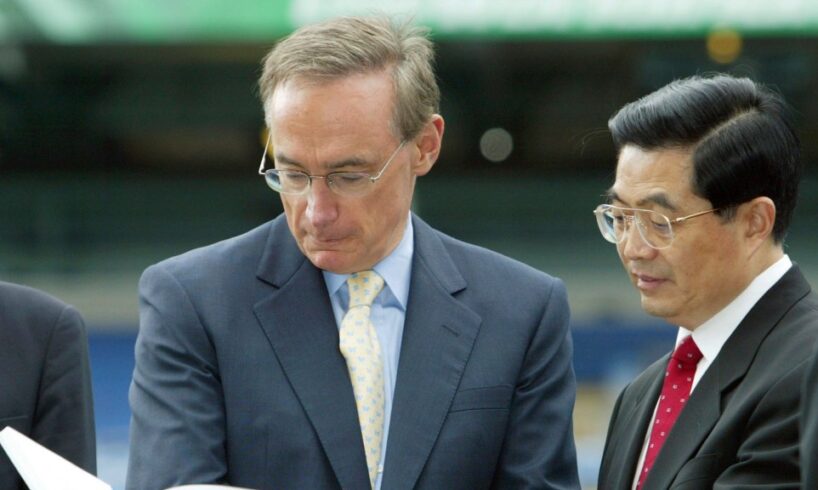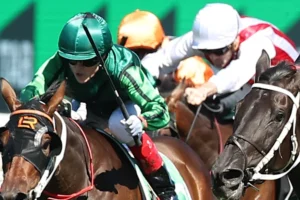
The 80th anniversary of the signing of the formal surrender documents by the Japanese in the Pacific War is this week. On Wednesday, China will hold a large-scale parade, officially described as a “Parade to commemorate Victory in the Chinese People’s War of Resistance against Japanese Aggression and the World Anti-Fascist War”. Within a day or so of the Chinese state media releasing the list of foreign representatives attending the parade, Australia’s major media outlets published multiple stories, all focusing on the attendance of former foreign minister and NSW premier Bob Carr.
Carr’s attendance is newsworthy because no current Australian government leaders — the prime minister, ministers or MPs — are going. In contrast, in 2015 the Abbott government sent then minister for veteran affairs Michael Ronaldson to attend the 70th anniversary. This year, Carr and former Labor premier of Victoria Daniel Andrews will both be attending, but in a personal capacity.
A number of media outlets — including The Sydney Morning Herald — asked Carr about his China trip. The Australian also queried him on whether the inclusion of Russia’s Vladimir Putin and North Korea’s Kim Jong-un on the guest list “gave him pause in attending the event”. ABC news observed that Carr was “not concerned that the event would also be attended by leaders from nations hostile to Australia”. Sky News simply headlined Carr’s and Andrews’s attendance as a “very bad look”.
Related Article Block Placeholder
Article ID: 1215088
The political symbolism of the parade is hard to miss. Indeed, with Putin, Kim and Iran’s Masoud Pezeshkian attending, Western commentators have regarded this year’s parade as evidence of China’s intention to showcase solidarity with these countries, as well as a show of defiance against the West. Singapore-based analyst Alfred Wu characterised this year’s proceedings as an attempt by Xi to “showcase that he is very strong, that he is still powerful and well received in China”.
It seems logical that the Australian media wanted to ask Carr about his decision. However, it seems all the major outlets have passed up a good opportunity to ask some seriously pertinent questions about how Australia, situated in the Asia-Pacific region, should handle itself when a tricky situation such as this presents itself.
Independent. Irreverent. In your inbox
Get the headlines they don’t want you to read. Sign up to Crikey’s free newsletters for fearless reporting, sharp analysis, and a touch of chaos
By continuing, you agree to our Terms & Conditions and Privacy Policy.
For example, our media could have asked: Australia sent a minister last time, so what’s changed? Would it be important for Australia to send an official representative? What might be the Australian government’s considerations for and against going?
David Goodman, director of the China Studies Centre, understands Australia’s decision but does not believe it is the best call:
“Australia’s decision not to send official representatives to the September 3 parade suggests two obvious explanations: not giving offence to Japan; and following the lead of the USA in its conflict with China. Either way, Australia’s interests are not best served; and opportunities for high-level interactions with other countries attending are lost.”
While recognising that one of the purposes of the parade could be its propaganda value for the Chinese government, Professor Goodman believes it is important to remember and honour history for what it is:
“The anniversary of the end of World War II in 1945 is an important date for all the countries of East and South-East Asia and the Pacific. Given Australia’s role in the Asia-Pacific and not just its crucial economic relationship with China, there is much to be gained from attendance.”
As far as history is concerned, China had entered WWII long before Europe. The “Mukden Incident” on September 18, 1931 marks the beginning of the occupation of China’s three northeastern provinces. Japan then began its full-scale invasion of China in 1937. One of the darkest episodes of this war was the Nanjing Massacre, in which the Japanese military killed an estimated 100,000 to over 300,000 Chinese in the Nanjing area. The event is often described in popular memory as the “Rape of Nanking: The Forgotten Holocaust of World War II”, and some details of the horrors of the massacre have been captured in the recently released film, Dead to Rights. Even many young people in China know about the infamous “Unit 731”, a secret Japanese project that carried out human medical experiments on civilians in Harbin City during the 1930s and 1940s.
Between 1931 and 1945, Japan’s wars of expansion drew in a broad array of opponents across the Asia-Pacific and beyond. While China endured the longest conflict and suffered the biggest losses, the war also involved many other countries including Australia, the US, the UK and South-East and East Asian nations. These diverse participants, entering the struggle at different times, ultimately formed part of the wider Allied effort against Japan.
In defence of his decision to attend, Carr said that, besides honouring the Chinese people’s sacrifices, China’s victory was also vital for Australia because “the Japanese advance had been so fast its navy was urging an invasion of Australia”. This point was also made a decade ago by Malcolm Turnbull, then communications minister:
Related Article Block Placeholder
Article ID: 1213435
“The central role of China as our ally in WWII is barely remembered in Australia today … We should never forget that China’s war against Japan was not just their war, but our war too — and without China we may not have won it at all.”
As for the purpose of holding the parade, the Chinese government spokesperson says the parade aims to “remember history, honour the martyrs, cherish peace and create a better future”. In comparison, unofficial opinion leaders such as Hu Xijin, former editor-in-chief of daily tabloid the Global Times, are less subtle. Hu argues that the parade will remind the world that World War II was not only a European conflict — people in the Asia-Pacific suffered tremendous losses too. He also believes that the parade will make the point, again, that the Japanese government has yet to convey genuine remorse to China and other Asia-Pacific neighbours.
Anticipating the parade, Japan has also actively lobbied other countries not to attend — an action that has angered Beijing. Besides, the Japanese government has consistently intervened to thwart the efforts of Korean and Chinese diasporas to erect statues in honour of “comfort women” in public places across South Korea, San Francisco, Berlin and Sydney.
Geoff Raby, former Australian ambassador to China, observes that Australia forgave Japan a long time ago, but there has never been a rapprochement between China and Japan. Given that China is our biggest trading partner and Japan a security ally, the Australian government confronts a conundrum. As Minran Liu, lecturer in international relations at Queensland University, puts it:
“The bigger, practical question for Australia is this: is Australia actually ready to engage seriously with East Asian history? That’s not just an academic issue, it has long-term consequences for how Australia thinks and acts in the region.”
Allan Behm from the Australia Institute and former senior adviser (2017–19) to then shadow minister for foreign affairs Senator Penny Wong believes that our South-East Asian neighbours offer some clue to this question:
“Indonesia, Malaysia and Vietnam seem to understand which way is up. In my humble opinion, Australia, Canada, NZ and the NATO members would have done themselves no harm in signalling their recognition of China’s contribution to WWII and its achievement since then. If Abbott could declare a ‘comprehensive strategic partnership’ in 2014, there’s plenty of scope for a bit of signal-giving.”
It seems both the Australian government and the media have yet to figure out how to square our geography with our history, and how to negotiate between memories of the past and the security imperatives of the present.





